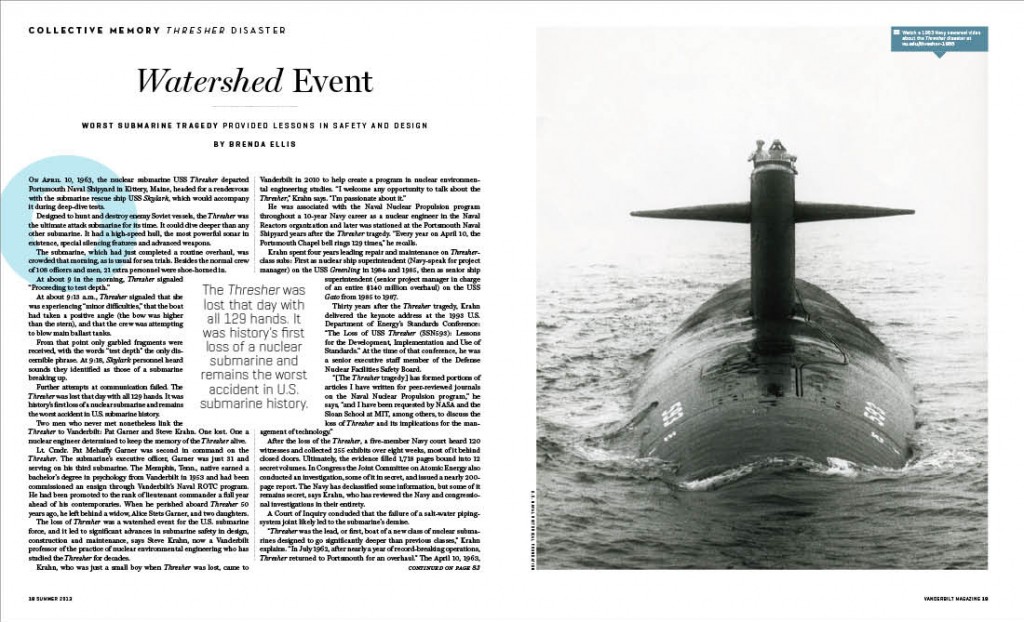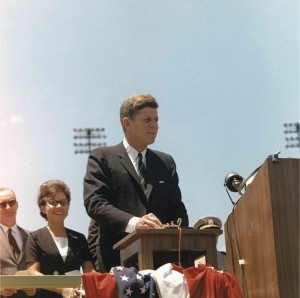LESSONS FROM DISASTER

Brenda Ellis’ recollection of the Thresher disaster [“Watershed Event,” Collective Memory, Summer 2013] and Vanderbilt’s connections then and now brought to mind that fateful April day 50 years ago. As a freshly minted ensign assigned to Adm. Rickover’s Naval Reactors office, I was an observer aboard the USS George Marshall during its initial sea trials out of New London, Ct. Like the Thresher only a hundred miles or so north, the Marshall was performing its initial deep-dive and quick-dive trials. The creaking hull and occasionally leaky valve clearly indicated we were approaching test depth. The calmness of the sea and the professional crew suppressed any thought of danger or fear.
But on the way back to port, the announcement that contact with an unnamed submarine on sea trials had been lost focused all aboard on the vulnerability of such a super-sophisticated vessel. Back at my office, I was to be involved during the next few years in major design and procedural changes that ensued after the tragedy.
Until reading the Vanderbilt Magazine article, I was unaware of the Vanderbilt connections and of Professor Steve Krahn’s studies about the lessons to be learned. I am glad to know that some gain can come from the tragic experience. For me, it did teach a never-forgotten lesson that care and attention to detail cannot be overemphasized. Many of the reasons for the Thresher disaster have been, unfortunately, prevalent in more recent ones.
Thanks for telling the story.
JIM VEIRS, BE’62, MS’69, North Granby, Ct.
GAMES AND MOOCS
I took Jay Clayton’s seminar on hypertext in fall 2004 during my freshman year [“Play Nation,” Summer 2013]. We played Star Wars Galaxies, and it was perhaps one of the best courses I’d ever taken at the school. It also led me to seriously pursue a master of fine arts degree in poetry and eventually land a job reviewing Android mobile games for an app discovery service in San Francisco called Fetch. Needless to say, I owe people like Professor Clayton a great deal in terms of finding direction and meaning in life. While my job of reviewing about 100 mobile games a week can get hectic, I can think of far less desirable jobs. I’m enrolled in Professor Clayton’s Coursera MOOC [Online Games: Literature, New Media and Narrative] and cannot wait for it to start.
MATTHEW WALKER, BS’09, Los Angeles
It’s refreshing to hear the opinion of someone who is open-minded about MOOCs while able to take a serious look at their limitations [“Learning in MOOC Years,” P.O.V., Spring 2013]. Too much of the conversation is automatically dismissive, and some of the rest doesn’t hold MOOCs to high standards. How they benefit an institution like Vanderbilt is uncertain, as your experience makes clear, and what we’re hearing from our contributors is much like the story you tell—that it significantly energizes and transforms on-campus teaching.
As you say, a month is an eternity in MOOC time and the limitations you describe are looking different every day. Just today we have a close look at new research in peer assessment. It’s hard to see how that will ever solve the problem of grading a massive number of students, but a month ago it was hard to see what’s happening now.
Congratulations on what sounds like a successful semester.
ROBERT MCGUIRE, Editor, MOOC News and Reviews
HEMODIALYSIS: THE EARLY YEARS
“At-Home Dialysis” [Research, Summer 2013] mentions Vanderbilt having a higher-than-average percentage of patients on peritoneal dialysis and the importance of helping kidney failure.
I thought your readers would be interested in knowing that my husband, Gerald E. Stone, B’54, MD’57, studied under Dr. Willem Kolff, inventor of the artificial kidney and hemodialysis. Dr. Stone then began using this invention in the early 1960s for those in the western part of New York state who had chronic kidney disease. He was a pioneer in hemodialysis when a machine was primed with blood, solutions had to be mixed by hand, and so forth.
Because we married in 1956 while he was still a medical student and I was teaching in a Nashville high school, I felt you ought to know that Dr. Stone was Vanderbilt-educated, and we both hope the consortium is successful. We’ve seen hemodialysis for chronic use as a ‘newborn.’ Your consortium might continue the process to another level.
LOIS GREENE STONE, Pittsford, N.Y.
INDELIBLE IMAGES

With the 50th anniversary of JFK’s assassination approaching [“Through History’s Lens,” Collective Memory, Winter 2013], readers might be interested in brief recollections by an individual who was on campus Nov. 22, 1963.One very vivid memory will haunt me for the rest of my life. I was in freshman English class that Friday when the news broke. President Kennedy had been shot in Dallas. At first there was complete silence followed by stunned disbelief and shock. Then tears.For a 17-year-old, assassination of a president was something to be read about in a textbook: Lincoln, Garfield, McKinley. Those men had died a long time ago. An assassination was not something to become ingrained into my reality. Many of us spent the rest of the afternoon glued to a portable radio, listening for an update. Perhaps the president was only wounded. Perhaps he could recover. But that was not to be. There was much still to contemplate and endure. A funeral procession to St. Matthew’s Cathedral and then on to Arlington. A young son’s final salute. A grieving widow. Images not easily forgotten.It’s hard to believe almost 50 years have passed. Unfortunately, those of us who were so traumatized by JFK’s assassination have had to endure more of the same. A president’s brother slain. A civil rights leader cut down by an assassin’s bullet at the Lorraine Hotel in Memphis. I was there in 1968 as a first-year medical student at the University of Tennessee-Memphis, much closer to another tragic event and its aftermath—the fires, the looting, the wail of sirens during the night. Much too close. Again, sights and sounds not easily forgotten.
DR. JAMES M. CUNNINGHAM, BA’67, Macon, Ga.
A GENTLEMAN AND A SCHOLAR
I am pleased that Vanderbilt Magazine has begun highlighting the accomplishments of certain alumni and faculty in the obituaries section, and write to suggest that Herschel Gower [MA’52, PhD’57] would have been worthy of this treatment. Last December before Christmas, Herschel died in Dallas, where he and his wife, Dona [MA’67, PhD’79], lived. Herschel’s heart was not in Texas, however. It was in Beersheba Springs, Tenn., on top of the mountain. Herschel and Dona looked forward each summer to driving to Beersheba, where they would spend six weeks or so, often with their devoted daughter, Alison. Every Vanderbilt person who had a summer home in Beersheba, Monteagle or Sewanee always looked forward to seeing the Gowers and hoped they could make it up for one more summer.
We shared a love of Tennessee history, and we both enjoyed talking about Dogtown, where Herschel grew up; about Montgomery Bell Academy, which he attended on scholarship; about our mutual friend, Margaret Lindsley Warden [BS’24], whom he met while he was a Vanderbilt student; and about whether Monteagle Mountain should instead be called “Broad Mountain” or “Sewanee Mountain.”
Herschel’s wonderful book, Pen and Sword: The Life and Journals of Randal W. McGavock, published in 1960, might not have been written had he not gone to the University of Edinburgh as a Fulbright scholar. While there he researched the history of the McGavock family in County Antrim, Ireland, and visited the McGavock home, Carnton. When he knocked on the door, the gruff Calvinist owner, before letting him in, asked if Herschel was a Catholic or a Presbyterian. Herschel, a Methodist, quickly said Presbyterian, realizing he would not have been invited inside otherwise. Years later when I visited Carnton, the owner was a Catholic.
Herschel got his Ph.D. in literature after the war and joined the faculty in 1956. He remained at Vanderbilt for 30 years and will be long remembered as a gentleman who delighted his English students with colorful stories about such Southern literary giants as Allen Tate, John Crowe Ransom and Robert Penn Warren. Herschel met Dona, a Dallas native, early in his Vanderbilt teaching days while she was pursuing her master’s degree.
I write this to reach former students of Herschel’s who will appreciate hearing one more story about this beloved, courtly and delightful scholar.
RIDLEY WILLS II, BA’56, Nashville
Editor’s Note: Mr. Gower’s obituary appeared on page 82 of the Spring 2013 issue.
ON TRACK

This young woman is the total package [Kristen Findley, BE’13; Roster, Athletics, Summer 2013]. Yes, she can run with the best, and yes, she is a terrific student, and yes, she fears nothing. But here’s the thing about Kristen Findley—she is a good person with a huge heart. I can’t wait to see what comes next for Kristen and her family. One thing I know: She will give it 110 percent and do it with a smile.
JOE MIZERECK, Tallahassee, Fla.
ALBRECHT ANCESTRY
Perhaps Editor GayNelle Doll and I are distantly related [“Other People’s Lives,” Editor’s Letter, Summer 2013]. My first paternal U.S. relative was Johannes Albrecht, who came to the U.S. in 1732. I only know because I’m about to complete a journal for my family that traces ancestry and my own experiences.
Having graduated in 1950, I’m now a Quinq. Since graduation, I’ve marked my advance in years partly by the class notes, going from the last page to a tiny paragraph on the first page!
Kudos on your responsibilities and the resultant readable, entertaining, informative magazine.
BRUCE ALLBRIGHT, BA’51, Scottsdale, Ariz.
We welcome your letters in response to contents of the magazine. We reserve the right to edit for length, style and clarity. Mail signed letters to GayNelle Doll, editor, Vanderbilt Magazine, PMB 357737, 2301 Vanderbilt Place, Nashville, TN 37235-7737; or email us.